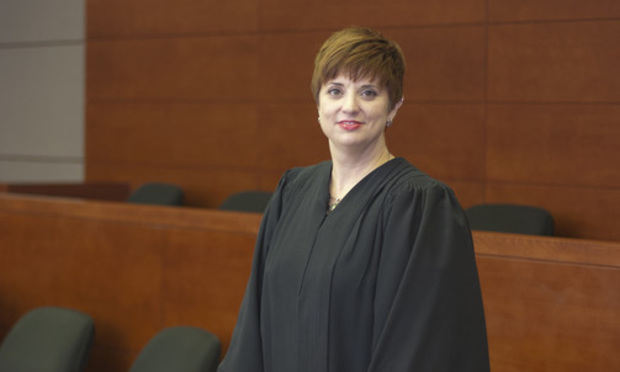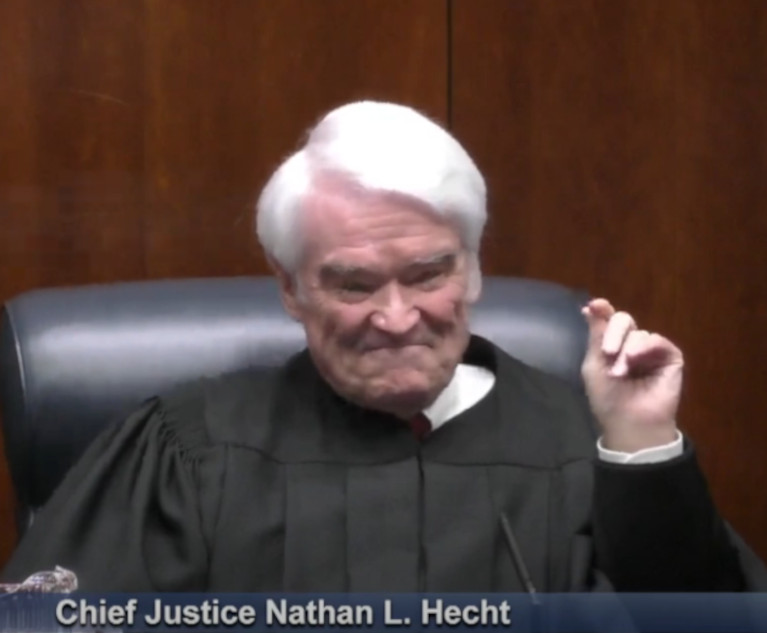Sanction: Dallas Judge's Law License Suspended 5 Times While on the Bench
The Texas Constitution says district judges must be licensed to practice law. But a Dallas judge kept failing to pay her bar dues on time, and her law license was suspended five times since she was first elected in 2007.
February 27, 2020 at 04:41 PM
3 minute read
 191st Civil District Court Judge Gena Slaughter of Dallas
191st Civil District Court Judge Gena Slaughter of Dallas
When lawyers don't pay their annual bar dues on time, it means a law-license suspension.
When judges do it, the consequences are more severe, as 191st District Judge Gena Slaughter learned this month when she was publicly reprimanded for violating judicial ethics rules and the Texas Constitution.
Her law license was suspended five times since she was first elected in 2007, according to a public reprimand that the Texas Commission on Judicial Conduct released Thursday.
Related story: Dallas Judge Sanctioned for Ex Parte Communication, Delay
It's the second public reprimand the commission has slapped on Slaughter in five months. She was sanctioned in October 2019 for holding an improper ex-parte communication, and delaying her ruling in a case for more than a year.
In Texas, annual bar dues must be paid by Sept. 1 of the year. But Slaughter paid late—in 2013, 2015, 2016, 2017 and 2018, the Feb. 7 reprimand said.
When it happened first in 2013, the judge addressed the issue quickly, so that her suspension only lasted days—from Sept. 1 to Sept. 6. But as the years progressed, Slaughter's suspensions spanned longer and longer intervals. For example, in 2017, she was administratively suspended from practicing law for September and October, the reprimand stated. When she didn't pay her dues on time in 2018, her law license was suspended for about nine months—from September 2018 to June 2019.
As the judicial conduct commission investigated, and reached out to the judge in 2018 and 2019, Slaughter initially failed to respond, the reprimand said. After the commission instituted formal proceedings against her, the judge finally responded and confessed to letting her bar dues go unpaid. She stated she had decided to delegate the duty of paying her bar dues to the treasurer of her officeholder account. Slaughter also stated she only learned of the lapses in her law license in 2017.
The judge added that until the judicial conduct commission reached her in April 2019, she hadn't known that her 2018 bar dues remained unpaid. She stated she immediately attempted to pay her bar dues. However, the public reprimand noted that Slaughter's law license wasn't reinstated until the end of June 2019.
The Texas Constitution requires district judges to be licensed to practice law, the reprimand noted.
The commission found that Slaughter's conduct broke a judicial-ethics rule that requires judges to comply with the law and to act in a way that promotes public confidence in the judiciary. It found Slaughter also violated provisions in the Texas Constitution that allow sanctions against judges for willful violations of judicial canons; for willful, persistent conduct that is inconsistent with the judge's duties; and for behavior that casts public discredit on the judiciary.
Slaughter didn't immediately respond to a phone call seeking comment.
Read the public reprimand:
This content has been archived. It is available through our partners, LexisNexis® and Bloomberg Law.
To view this content, please continue to their sites.
Not a Lexis Subscriber?
Subscribe Now
Not a Bloomberg Law Subscriber?
Subscribe Now
NOT FOR REPRINT
© 2025 ALM Global, LLC, All Rights Reserved. Request academic re-use from www.copyright.com. All other uses, submit a request to [email protected]. For more information visit Asset & Logo Licensing.
You Might Like
View All
ExxonMobil Sues California AG Bonta, Environmental Groups for Advanced Recycling 'Smear Campaign'

2 Judges: Meet the New Chief Justice and the GC Who Just Rose to the Bench
3 minute read

Trending Stories
- 1DC Bar’s Proposed Anti-Discrimination, Harassment Conduct Rule Sees More Pushback
- 2California's Chief Justice Starts Third Year With Questions About Fires, Trump and AI
- 3Justin Baldoni Sues Blake Lively and Ryan Reynolds for $400M in New Step in 'It Ends With Us' Fight
- 4Top Leadership Changes Coming for NJ Attorney General's Office
- 5SCOTUSBlog Co-Founder Tom Goldstein Misused Law Firm Funds, According to Federal Indictment
Who Got The Work
J. Brugh Lower of Gibbons has entered an appearance for industrial equipment supplier Devco Corporation in a pending trademark infringement lawsuit. The suit, accusing the defendant of selling knock-off Graco products, was filed Dec. 18 in New Jersey District Court by Rivkin Radler on behalf of Graco Inc. and Graco Minnesota. The case, assigned to U.S. District Judge Zahid N. Quraishi, is 3:24-cv-11294, Graco Inc. et al v. Devco Corporation.
Who Got The Work
Rebecca Maller-Stein and Kent A. Yalowitz of Arnold & Porter Kaye Scholer have entered their appearances for Hanaco Venture Capital and its executives, Lior Prosor and David Frankel, in a pending securities lawsuit. The action, filed on Dec. 24 in New York Southern District Court by Zell, Aron & Co. on behalf of Goldeneye Advisors, accuses the defendants of negligently and fraudulently managing the plaintiff's $1 million investment. The case, assigned to U.S. District Judge Vernon S. Broderick, is 1:24-cv-09918, Goldeneye Advisors, LLC v. Hanaco Venture Capital, Ltd. et al.
Who Got The Work
Attorneys from A&O Shearman has stepped in as defense counsel for Toronto-Dominion Bank and other defendants in a pending securities class action. The suit, filed Dec. 11 in New York Southern District Court by Bleichmar Fonti & Auld, accuses the defendants of concealing the bank's 'pervasive' deficiencies in regards to its compliance with the Bank Secrecy Act and the quality of its anti-money laundering controls. The case, assigned to U.S. District Judge Arun Subramanian, is 1:24-cv-09445, Gonzalez v. The Toronto-Dominion Bank et al.
Who Got The Work
Crown Castle International, a Pennsylvania company providing shared communications infrastructure, has turned to Luke D. Wolf of Gordon Rees Scully Mansukhani to fend off a pending breach-of-contract lawsuit. The court action, filed Nov. 25 in Michigan Eastern District Court by Hooper Hathaway PC on behalf of The Town Residences LLC, accuses Crown Castle of failing to transfer approximately $30,000 in utility payments from T-Mobile in breach of a roof-top lease and assignment agreement. The case, assigned to U.S. District Judge Susan K. Declercq, is 2:24-cv-13131, The Town Residences LLC v. T-Mobile US, Inc. et al.
Who Got The Work
Wilfred P. Coronato and Daniel M. Schwartz of McCarter & English have stepped in as defense counsel to Electrolux Home Products Inc. in a pending product liability lawsuit. The court action, filed Nov. 26 in New York Eastern District Court by Poulos Lopiccolo PC and Nagel Rice LLP on behalf of David Stern, alleges that the defendant's refrigerators’ drawers and shelving repeatedly break and fall apart within months after purchase. The case, assigned to U.S. District Judge Joan M. Azrack, is 2:24-cv-08204, Stern v. Electrolux Home Products, Inc.
Featured Firms
Law Offices of Gary Martin Hays & Associates, P.C.
(470) 294-1674
Law Offices of Mark E. Salomone
(857) 444-6468
Smith & Hassler
(713) 739-1250






